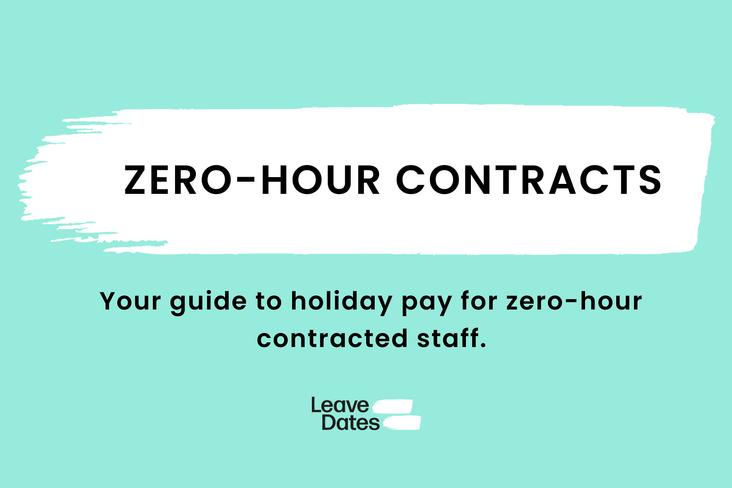Navigating holiday pay for workers on zero-hour contracts can be somewhat baffling but as the employment landscape evolves, understanding how different working arrangements intersect with statutory holiday entitlements is crucial.
This guide will explore the murky realms of holiday pay within the context of zero-hour contracts, shedding light on the regulation, rights and calculations that you need to understand to ensure non-fixed hours workers aren’t shortchanged. This article will equip workers and employers with the knowledge needed to ensure equitable holiday compensation for those engaged in this flexible employment model.
In October 2024, the UK Government's Employment Rights Bill was passed with major implications for zero-hours contracts. The changes are not expected to come into effect until 2026 but will change the working landscape for around one million employed under these arrangements.
Table of contents
- What are zero-hours contracts?
- What’s the deal with holiday pay?
- Holiday pay for zero-hours contracts: A guide
- Upcoming changes to zero-hours contracts
- Ensuring adoption and uptake
What are zero-hours contracts?
Zero-hours contracts, in the UK, are a unique employment arrangement where the employer does not guarantee a specific number of hours to an employee.
Instead, the employee is available for work when needed, but there is no obligation for the employer to provide regular or consistent hours. On the flip side, the employee is not obliged to work the hours offered if they don’t wish to. These contracts are commonly used in industries where demand for labour can fluctuate – healthcare, retail, hospitality, to name a few.
Zero-hour contracts sometimes get a bad rap, as they can put workers in a situation of uncertainty and financial instability, but in a world and work culture where flexibility is of increasing value and importance, they offer a lifeline for many. When these contracts are transparent and fair, workers enter into them willingly and with full understanding, and are recognised as an employee with rights like any other, they needn’t be regarded as inherently inferior.
There are many people for whom zero-hour contracts offer an easy route into work that they can sustain and enjoy. Students, for example, may wish to dial up or down the number of hours they work depending on their study commitments and assignment deadlines. For recent graduates or those between jobs, they can offer a useful temporary solution until a more stable employment opportunity arises. At the other end of the age spectrum, retirees might also appreciate a lower-commitment option to earn some extra money without committing to a fixed schedule, allowing them to reserve time for leisurely pursuits, to spend with family and accommodate any health issues.
Particularly in the current cost of living crisis, where household bills have increased dramatically without corresponding rises in wages, zero-hours contracts may offer a much-needed opportunity to supplement household income.
They can provide an additional revenue stream that can be made to fit around existing work and caring commitments. Zero-hours contracts often have a lower barrier to entry, making them more accessible to those who need to quickly ease the strain on the household budget. The adaptability of these roles means a person can work more hours at times of heightened financial need (eg to pay for Christmas, winter fuel bills, or summer childcare) and then reduce their hours when circumstances allow.
For employers, zero-hours contracts offer obvious benefits, allowing them to scale-up or down their staffing quickly in response to changing market trends or seasonal fluctuations, without having to hire or lay-off workers. This allows them to manage costs through maintaining a flexible workforce that they can adapt quickly. It also enables them to plug any gaps that might arise from fixed-hours employees taking periods of leave.
While zero-hours contracts have been criticised as exploitative, offering little job security, lack of income predictability, and limited access to benefits, they are not inherently bad – the key is in the term ‘contract’. This can be as fair and generous as the employer wants to make it; as such, there is ample scope to protect the zero-hours worker from exploitation and to provide the security and fairness that some presume this working arrangement to lack. Zero-hours contracts should never be used to shirk responsibilities as an employer or to save money as a result of those employees not knowing or claiming what they are entitled to.
What’s the deal with zero hour contract holiday pay?
Two the perceived areas of unfairness related to zero-hour contracts – limited income predictability and limited access to benefits – can be partly addressed through a better understanding of holiday pay, which zero-hours workers are entitled to.
With permanent employees on set hours, holiday pay is fairly straightforward – you accrue a certain amount of holiday based on hours worked, and then take this as paid leave when you wish to. The principle is that employees should not suffer financially for taking holiday.
There is a common misconception that because employees on zero-hour contract holiday pay aren’t required to work when they don’t want to and so typically won’t need to request and book holiday via the same mechanisms as an employee with contracted hours, that they aren’t entitled to holiday pay. This is not true – they have the same legal entitlement to the same level of paid holiday. If you are wondering, ‘do zero hour contracts get holiday pay?’ the answer is yes, they are entitled to 5.6 weeks of paid holiday per year, just like fixed-hours workers. So how does holiday pay work on a zero-hour contract, when you don’t have set hours?
Holiday pay for zero-hours contracts: A guide
To ensure holiday pay for your zero-hours staff is fair and equivalent to what a fixed-hours employee would receive, so that they are not short-changed purely due to the nature of their contract, it is important to consider the underlying principles of holiday pay.
The amount of holiday pay an employee is due is based on two things: the number of hours worked and how they are paid for hours worked.
In this way, it will be reflective of what they would have earned had they been at work and so satisfies the fundamental principle that there should be no financial barrier to taking holiday.
This is pretty straightforward to calculate for full- or part-time workers with fixed hours and pay – the amount they are paid per month remains the same, even if they take some holiday. However, for zero-hours workers, employers can ensure accuracy by using a zero-hour contract holiday pay calculator to calculate an average weekly rate for a fair holiday pay entitlement. By contrast, a zero-hours employee typically won’t work fixed or regular hours, so the amount they are paid each month (or week) will vary.
Using a Zero Hour Contract Holiday Pay Calculator
For zero-hours employees, calculating holiday pay can be more complex due to fluctuating work hours. Employers can simplify this by using a zero-hour contract holiday pay calculator, which gives you the entitlement based on the worker's average earnings over the past 52 paid weeks. This ensures a fair and accurate payment for the holiday leave taken.
Therefore, to ensure you meet your legal obligations and your zero-hours employees receive the paid holiday they are entitled to, you will need to determine their holiday pay rate by using a zero-hour contract holiday pay calculator. The fairest way to calculate this, due to the fluctuating and often seasonal nature of zero-hours employees’ working patterns, is to look back over the employee’s historical pay data to calculate an average weekly rate. This can then be used as the basis for what that worker should be paid for a week’s leave.
Under UK law, the reference period for calculating the holiday pay for a worker with variable pay or variable hours is 52 paid weeks (the ‘holiday pay reference period’).
It’s important to recognise that this is not (necessarily) consecutive, calendar weeks; paid weeks are only those weeks in which the employee has worked and remuneration is payable. Under the Employment Rights Act 1996, the week starts on a Sunday and ends on a Saturday. Employers can look back up to 2 years to collect 52 weeks’ of pay data.
Where the employee has not been employed for long enough, or you cannot retrieve 52 weeks’ worth of pay data within a 2-year period, you should use the total number of complete weeks of data you have available for that employee. This means that:
- For a zero-hours employee who has been working for you for 2 years, you should use their most recent 52 paid weeks to calculate their holiday pay rate (which may be more or less than their holiday pay rate for the previous year).
- For an employee who has been working for you for 30 complete weeks, you should use 30 weeks’ data to calculate their rate.
- For an employee who has been working for you for 4 years but has not completed 52 paid weeks within the last 2 years, you should shorten the reference period to however many paid weeks have been completed in the last 104 weeks.
It is unlikely but possible that a worker might wish to take leave before they have worked a complete week, where you will have no reference period and so no data to use. In this scenario, you are required to pay them an amount that would be a fair representation of their pay for the duration of their leave. To do this you should consider their rate of pay, any pay already earned and what other workers in comparable role are earning per week.
When you pay the holiday will depend on a variety of factors, but typically it should be paid within the pay reference period in which the leave was taken. For example, if the worker is paid monthly, and they take paid holiday in August then they should receive their holiday pay in the August pay run.
Whether or not your zero-hours contracts give those employees the same paid holiday entitlement as fixed-hours employees (if this is more than the legal minimum entitlement) is at your discretion, though if you want them to feel equally valued in and committed to the organisation, then an equitable policy would contribute to sending this message.
Upcoming changes to zero-hour contracts
Due to increasing scrutiny and criticism of zero-hour contracts, there has been pressure on the UK government to reform this employment type. The main reason for the proposed changes was that these contracts were believed to unfairly benefit employers and keep people out of secure employment with predicatable schedules. Several private members' bills have sought to create fairer conditions for zero-hours contract workers over the years, with only the Workers (Predictable Terms and Conditions) Act 2023 receiving Royal Assent, although this law never came into force and would be repealed by the Employment Rights Bill 2024.
In October 2024, the Employment Rights Bill was passed by parliament and will require employers to offer guaranteed hours to all employees on zero-hour contracts. The new laws, expected to come into effect in 2026 are ungergoing consultation and will give workers on zero-hours contracts the right to guarantees hours, notice of shifts and payment for shifts cancelled at short notice. Workers will also have the right to protections against 'detriment and dismissal', meaning employers can not reduce or stop offering shifts to an employee for declining a shift.
Ensuring adoption and uptake
What’s essential, though, is that workers do not miss out on what they are legally entitled to simply due to their contract type. This is especially important considering that zero-hours workers have to adapt to a potentially unstable income, which though it may provide much-needed flexibility raises its own difficulties for those individuals in planning their lives.
Knowing their rights and being able to claim holiday pay on zero hours contracts with ease goes a long way towards making this a fairer and more sustainable work option for those whom it suits, ensuring that both they and their employer can reap the benefits that these arrangements offer.
To ensure the fair and transparent use of zero-hours contracts to the benefit of all until changed some into effect in 2026, it is essential that holiday pay is discussed and awareness of raised, so that any employee on one of these contracts knows what they are entitled to and claims it. Used correctly, zero-hours contracts provide mutual benefit and any cost-savings for the business will be associated with a corresponding value to the worker, meaning there is no need, or justification, for a lack of transparency on holiday pay.
In summary, zero-hours workers have exactly the same right to holiday pay as fixed-hours workers – 5.6 weeks per year – calculated based on an average weekly rate for their preceding 52 paid weeks (or total paid weeks, if less).
The information on this site is general and may not apply to specific circumstances. It should not be considered legal advice. We strive to provide accurate information but cannot guarantee its accuracy. We are not responsible for any losses resulting from reliance on the information on this site.





